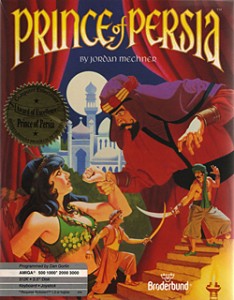370th played so far
 Genre: Platform
Genre: Platform
Platform: Various
Year of Release: 1989
Developer: Broderbund
Publisher: Broderbund
Prince of Persia is a familiar title. I remember playing it on our old PC, back in the days, for some time unable to play it properly as the shift-key on the keyboard didn’t work – some cheating was involved to get further into the game.
So yeah, I’ve been looking forward to revisiting one of the games of my childhood. This should be fun.
Our Thoughts
Some game skills never disappear. While some of my reflexes and precision jumps are off now, not having played this game for about 18 years, part of the muscle memory was still there, as were the ways of thinking – when to do the long jumps, when to step forward, floor switches to trigger and ones to avoid. While I never was an expert, after a bit I did as well as I always did and remembered a fair share of the way.
What helps is how well the levels are put together. While they don’t telegraph what’s happening, and don’t make real life sense, there is some internal logic with the positioning of floor plates, and plenty of smaller pointers in what could happen and how they interact. The number of elements to learn in the levels are fairly small – most of them introduced in the first level, the last few (mostly some saw blades chopping you in half as you walk through) early on, with everything being clear what they do.
This plays within a time limit of sixty minutes. From a story perspective, this makes sense – the vizier will get you if you waste too much time – but it also works for the game. For a long time, nobody really cares (to be honest), as you’re not going to get far enough in the game that that hour sets you back more than a few levels. A lot of time is spent mapping the levels and finding the right path through – the fastest, too, but that comes with the frequent restarts you’ll have no matter what. Later, it adds pressure, but as (if you get good enough) the game is easily beatable within the limit, it’s not the biggest limitation in the game. Skill takes over first.
What stands out about the game are the animations. Rotoscoped (yeah, an early version of what The Last Express did – it’s almost a Broderbund trademark), the lead character’s animations are based on the designer’s younger brother walking around, jumping and running. The animations look very fluid and natural as a result. It looks nice, although it causes its own effect on gameplay. The character feels sluggish, being slow to get started and taking his time slowing down – you’ll probably fall off ledges occasionally because you misjudge the stopping distance of your character. Because of the same animation restrictions, your running jumps need to start a bit early as well – once you get to the edge of the ledge, the falling animation already starts and you can no longer jump.
Even so, the game looks amazing for it. Sure, it’s dated for now, but for its age it looks amazing (and looked amazing to us back then), on all systems and resolutions, with little compromise even on the lesser systems I believe I used to play it on. The higher levels especially look appropriately oriental, with all characters animating expressively.
Final Thoughts
Dated as it is there is something to be said for a game that remains compelling despite the amount of rote-learning you need to do to master any of the levels. It is a very tough game which makes the more recent versions (like Sands of Time) play like a cakewalk in comparison. Okay those games have their fair set of challenges too but this is beyond the pale. The princess is very much other such female characters present in video games… a plot device and pretty inconsequential otherwise. Samus really was a blip.
[…] always trigger properly, making jumps far harder than was needed. While the game resembled Prince of Persia in its controls, it has some awkward choices in when you jump or step forward and how far you jump. […]
[…] original Prince of Persia was a stand out platformer, its animation standing out but the full game having a story and set up […]